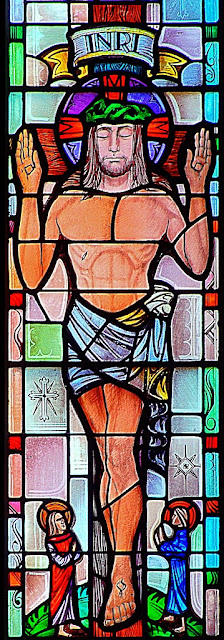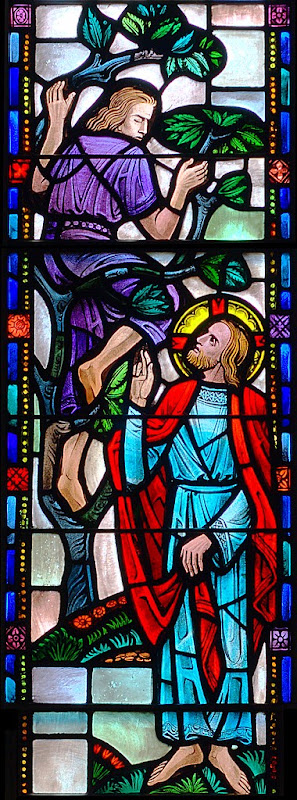by Pastor Paul Wolff
 |
The transfiguration of Jesus is one of the great mysteries of the Bible. However, the mystery is NOT that we don’t really know what happened. On the contrary, three of the Gospels recount the events of the transfiguration so we know well what happened. The mystery is: what does the transfiguration mean?
What happened was that Jesus took Peter, James, and John up a mountain and the appearance of Jesus was transfigured so that he shone with a bright light. The ancient prophets, Moses and Elijah, appeared talking with Jesus about his upcoming “departure” in Jerusalem. Then a voice from a cloud said, “This is my beloved Son, with whom I am well pleased; listen to him.”
Needless to say, this doesn’t happen every day, and that is part of the mystery, but it was not unprecedented in the history of the world. In the exodus from Egypt, Moses was talking with God on Mt. Sinai, receiving the law for God’s people, and when he came down the mountain his face was shining because he had been in the presence of God. Moses’ presence at the transfiguration of Jesus gives us a clue about the meaning of this mysterious event. The shining light was the glorious holiness of God. The difference is that in the case of Moses the light was residual from God’s glory and it eventually faded away. In Jesus’ case, the light came from within Him. He was the source of the light.
 |
When God created light on the first day of creation he did not create any “natural” sources for the light until day four so we must conclude that God, Himself, was the source of the daylight for the first three days of creation. Also, in the Revelation that Jesus gave to John on Patmos later in his life, John writes of the heavenly paradise, “And night will be no more. They will need no light of lamp or sun, for the Lord God will be their light.” (Revelation 22:5)
The question is, if Jesus was the source of the glorious light on the mount of transfiguration, why didn’t anyone see it in His life before then? Again, we can look back to Moses for a clue. When the Israelites saw Moses reflecting the holiness of God they could not bear to look at him. Sinners cannot bear the holiness of God, even the greatly diminished reflected glory in the face of Moses. Scripture tells us that “no one can see the face of God and live.” (Exodus 33:20) Moses received special grace from God to be in His presence, but even Moses was not permitted to see the full glory of the face of God.
 |
Like everything that Jesus did in His life, it was out of love for us that Jesus hid His glorious holiness except for this brief time on the mountain with Peter, James, John, Moses, and Elijah. Sinners cannot bear holiness because it shows us just how corrupt we are because of our sin. We are all blinded by our sin. We see everything through corrupt, sinful eyes. This is a twisted view of reality. We are so used to sin and comfortable with it that we imagine that we aren’t so bad and that some of the things we do are actually so good that even God Himself must be pleased. This couldn’t be further from the truth. Sin corrupts us totally. Everything that we are and do is tainted by sin so that even our righteous deeds are as filthy rags (Isaiah 64:6) in God’s holy sight. For sinners to stand in the presence of God’s holiness would make us so aware of the corruption of our sin that we would die. Even to get a glimpse of God’s holiness (as the Israelites saw in Moses) would be unbearable. This is a function of the Law of God – to show us our sin. However, as Jesus tells us, “God did not send His Son into the world to condemn the world, but in order that the world might be saved through Him.” (John 3:17) So Jesus hid His holiness and lived an ordinary life no different from any other man, except that He was without sin – but even this He did quietly without drawing attention to Himself.
The glory of God’s holiness revealed in Jesus in the transfiguration is set in sharp contrast to the grotesque horror of the crucifixion, and yet, both events reveal the same glory of God. The holiness of God is not a pure abstraction, and it is not only made tangible by an unbearable light. The holiness of God is, more than anything else, expressed in a love that moved God to become incarnate as Jesus Christ as one of His created people to bear the sins of the world and to suffer and die to pay the price for our sin to redeem us. As Jesus hung dying on the cross He not only continued to hide His glory, but He endured God’s wrath over our sin to spare us from the punishment that we deserve. Jesus did not make us endure the guilt of our sin, but He endured the punishment of the sins of the whole world.
 |
The hiddenness of Christ’s glorious holiness is a mystery that is only partially revealed in the event of the transfiguration. However, this is how God works in the world. Out of love for us, God does not blast us with His glory. God does not force us to love Him, nor does He force us to endure the unbearable reality of our sin. Instead, God is merciful to us and works through the means of His Word and Sacraments to show us our sin and our savior. The “weakness” of these “Means of Grace” is that they can be rejected by people. The strength of these Means of Grace is that God works through them to bring us the salvation won for us by Jesus on the Cross.
All people on earth live under the grace of God, and part of this grace is that we are blind to the full reality of our sinful corruption, just as we are blind to the glorious holiness of God. We should not attempt to perceive the holiness of God because in our sinful condition we are likely to be led astray by the lies of the devil. We may think we see a divine revelation, but it is most likely to be our own sinful desires within us. Yet God has given us His Holy Scriptures to show us our true savior, Jesus Christ, so that all who believe in Jesus are saved from their sins and will share in the glorious holiness of God, of which we see a brief glimpse in the Transfiguration.




